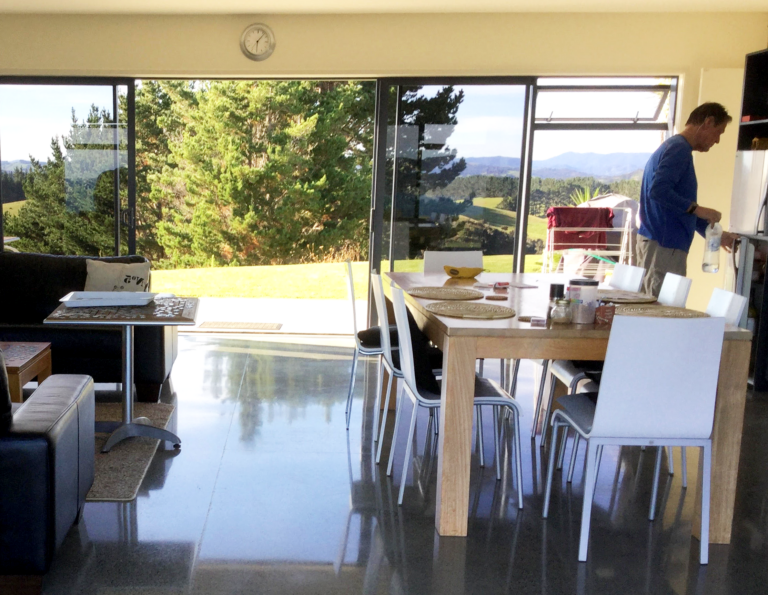Home exchange, also known as home swapping, can offer a budget-friendly avenue for retirees looking to travel differently. While many people imagine traveling in retirement, high-end vacations year around, the expense of hotels and car rentals can quickly outpace retirement budgets. And in addition to being pricey, luxury hotels don’t offer a genuine local experience. Home exchange offers authentic experiences off the beaten path at a price that allows people to stay longer and experience more.
That’s what Don and Barbara Dennis of Marblehead, Mass., found after retirement, he from architecture and she from teaching. They used to travel during the summer, but after retirement, they “flipped our life around,” says Don, lining up 10-20 home exchanges to take them to warm places from January through March every year.
“We were in the Caribbean all winter and hardly spent a night in a hotel,” says Don. “We take this to extremes. Most people do this once or twice yearly because of their work schedule.”
With no work schedule to hinder them, the Dennises have done more than 200 exchanges in the last two decades. Like them, other retirees may find the following features of home exchange make this method of travel a great fit.
1. Live Like a Local, Enjoy the Comforts of Home
The defining characteristic of home exchange is that you are, of course, staying in someone’s home, which makes for travel with a more authentic and hospitable feel than typical accommodations can provide. For retirees who value the comfort of home as much as the experience of travel, this can feel like a relief.
“I don’t think that you can have the same experience when you’re staying in a rental or a timeshare or anything where you’re paying money versus a home exchange, and that’s because of the hospitality factor,” says HomeExchange.com founder Ed Kushins, who regularly exchanges his house in Hermosa Beach, Calif. “Their effort in making sure you have a good time comes more from their desire to share with you their home, their area, their friends, and their neighbors.”
2. Big Experiences Even for Small Budgets
Emmanuel Arnaud, CEO of HomeExchange.com, calls out one of the biggest benefits of home exchange: Staying for free is a great way to save money. This can be particularly attractive to retired people who dream of travel but have limited income to spend on it. Though reputable home exchange sites charge a small membership fee, the amount pales compared to what you save by using their service.
“When you retire, your income might diminish,” he says. “The fact that we allow you to go on a vacation for virtually nothing makes it very interesting for people who are retired.”
In this moment of high inflation, when prices on everything—including travel—are increasing, eliminating accommodation costs can be the difference between being able to go somewhere and staying home.
3. Enjoy Local Living With an Extended Stay
Arnaud emphasizes that home exchange lends itself to a slower, more languid approach to travel, which works quite well for retired people. Retirees might be “people who can do 100 nights of exchange per year, whereas your typical family can do a week or two over the summer and then a few long weekends,” he says. Like the Dennises, “retirees can be gone for three or four months; they might do ten exchanges of one or two weeks and use their subscription to the fullest.”
Veteran home-exchanger Marcy Lay of Cape Cod, Mass, finds that these longer stays take the pressure off the need to be “taking advantage” of every single moment in a new place: “Say you have a rainy day, and you’ve spent $300 in your hotel room, and you’re in London. You’d feel bad. But if you’re there for a month and it rains for a day, you’re in a lovely, comfortable home, doing your regular activities, and not paying anything for it…. eh, who cares?”
4. Participate in the Sharing Economy
Home sharing often includes sharing more than just a home. Many exchangers freely offer up everything they use in their own lives, including cars, bikes, boats, and even friends and family. Arnaud said that 20-30% of exchanges on HomeExchange.com also include exchanging a car.
Since home exchange is essentially a barter system, which precludes exact one-to-one matching of amenities, there’s always the possibility of finding yourself in an unexpected or luxurious situation.
“Sometimes we’re just shocked with the luxury that we walk into,” reflects Dennis. “I can’t begin to tell you some of the palaces we’ve stayed.”
That same non-linearity extends to the entire travel experience, such as the time that Dennis stayed in a house whose homeowners were staying with friends nearby and stopped in to ask if he and Barbara wanted to go sailing.
“It’s more sort of serendipitous and less plan-full” than other kinds of travel, says Lay. “If you go into it without set expectations, who knows what you might end up experiencing? That’s what we enjoy about it.”
5. Expand Your Circle of Friends
While home exchange often takes place without the exchangers meeting in person, they always communicate online and/or by phone first to set up the exchange and make sure everyone agrees on the details. This interchange alone can lead to people developing relationships, especially if they exchange repeatedly.
But there are also many cases in which exchangers meet each other, such as when an exchanger uses a guesthouse for exchange and stays home when people come. Other times guests may arrive before homeowners have left town, and the homeowners make a point of greeting them.
In many cases, exchangers are eager to meet and get to know each other, a far different situation than travelers using hotels or Airbnbs can hope to experience. In this way, home exchange can help you form real and lasting relationships with people all over the world.
6. Travel Responsibly
There’s been a harsh spotlight on tourism in recent years as the industry takes stock of how travel contributes to greenhouse gas emissions and causes overwhelm and damage in particularly touristed destinations. Home exchange is a way to reduce one’s contribution to those concerning trends.
“We’re a responsible way of traveling because we’re using resources that are already there,” says Arnaud. “We’re utilizing our homes and buildings better. And the local impact is very different.”
Take the example of Paris, where the majority of units in some close-in neighborhoods have been converted to vacation home rentals, robbing communities of their sense of culture and vitality. Staying in someone’s apartment in Paris does not contribute to this trend and allows you to experience a neighborhood that continues to reflect everyday Parisian life.
7. Join a Community Built on Trust
Home exchangers exhibit a high degree of trust, which is aided by various features of the exchange websites, such as detailed descriptions of exchangers and their homes, rating systems, and tracking of people’s rates of responses to inquiries.
While letting strangers stay in your own home may feel off-putting or even threatening, those who enjoy home exchange talk animatedly about the high levels of trust and the overarching sense of community among those who do this regularly. Retirees can feel at home in a trusting community in which they can have confidence.
Lay reports that she has never found the house a mess after an exchange, even after doing it some 40 times. “People say, ‘Aren’t you afraid they’ll steal your stuff?’” she muses. “Well, no. If they’re coming to your house, they’re going to treat your house like they want their house treated. People are super respectful.”
Image Credit: Marcy Lay’s home exchange house in Cable Bay, North Island, New Zealand
Seniority is published by Finance of America Reverse LLC. The views expressed in this publication are those of the author alone and do not necessarily reflect the views and opinions of Finance of America Companies. This article is intended for general informational and educational purposes only and should not be construed as financial or tax advice. For more information about whether a reverse mortgage may be right for you, you should consult an independent financial advisor. For tax advice, please consult a tax professional.




